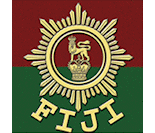Republic of Fiji Military Forces (RFMF)
 The Republic of Fiji Military Forces (RFMF) was a frustration. The US had long valued RFMF roles in peacekeeping operations such as Lebanon, the Sinai, and UNAMI in Iraq. Fiji soldiers, big, capable, and charming, had an excellent PKO reputation. On the other hand, after Col. Rabuka's coups in 1987, RFMF leaders involved themselves in domestic politics to the nation's detriment. Bainimarama and his close advisors had no special talent for governance, and Fiji suffered -- politically, economically, and socially.
The Republic of Fiji Military Forces (RFMF) was a frustration. The US had long valued RFMF roles in peacekeeping operations such as Lebanon, the Sinai, and UNAMI in Iraq. Fiji soldiers, big, capable, and charming, had an excellent PKO reputation. On the other hand, after Col. Rabuka's coups in 1987, RFMF leaders involved themselves in domestic politics to the nation's detriment. Bainimarama and his close advisors had no special talent for governance, and Fiji suffered -- politically, economically, and socially.
By 2006, Fiji's stability depended on the Iraq War. Hundreds of ex-soldiers worked as mercenaries and their remittances, about $275 million a year, come a narrow second to tourism as Fiji's top earner. If peace were to break out, Fiji faced an army of unemployed mercenaries coming home.
Under Republic of Fiji Military Forces Act CAP 81, the RFMF is charged with, and responsible for the defence and state security of Fiji in the maintenance of Law and Order in land and sea, in support of the Police, Maritime Surveillance of Fiji’s Maritime Zone and relevant departments. It also provides forces to international peacekeeping operations in line with Government foreign policy on world peace, troops with engineering expertise for nation building, in the area of rural infrastructure development and youth training for life skills.
Military branches of the Republic of Fiji Military Forces (RFMF) are the Land Forces and Naval Forces. The Ministry of Defense oversees both the Fiji Police Force and the Republic of Fiji Military Force (RFMF). Police are responsible for law enforcement and the maintenance of internal security. The RFMF is responsible for external security. The POAD also authorizes soldiers to perform the duties and functions of police and prison officers in specific circumstances.
| Naval Unit | |
| Fiji Infantry Regiment | |
| Regular Force | |
| 1st Battalion | |
| 2nd Battalion | |
| 3rd Battalion | |
| Territorial Force | |
| 4th Battalion | |
| 5th Battalion | |
| 7th/8th Battalion | |
| Fiji Engineer Regiment | |
| Logistic Support Unit | |
| Force Training Group | |
Since colonial times, Fiji military officers trained in Australia and New Zealand, and both New Zealand and British troops used Fiji as a training ground for jungle warfare. Until 1981 the chief of staff of the Royal Fiji Military Forces (RFMF) was a New Zealander. The all-volunteer RFMF has never seen action on Fiji territory; in 1983 there were nearly as many Fiji soldiers stationed in the Sinai and Lebanon as part of the UN forces as there were in Fiji. All told, the RFMF army had 2,500 uniformed soldiers in 1983 — about 1,900 regulars and some 600 so-called territorial forces. The latter could either be former regulars or new recruits and, like the regulars, were eligible for service in the UN forces. One infantry battalion was stationed in Lebanon, another in the Sinai, and a third at home in 1983; there was also a small engineering company and a modest artillery company.
In 2006, Canberra deployed an amphibious task force to waters off of Fiji in response to an anticipated military coup. However, a major factor in the government’s ultimate decision to not intervene was the concern that the ADF lacked the firepower to overcome the well-trained Fijian military at an acceptable cost to Australian forces.
More military officers will be travelling to China to further their studies at China’s National Defence University. This was confirmed 27 July 2016 by the Republic of Fiji Military Forces (RFMF) Commander, Brigadier-General Mosese Tikoitoga, following his trip to China with Prime Minister Voreqe Bainimarama. As part of his trip, Brigadier-General Tikoitoga visited the university and commended them for their contribution to enhancing military skills of the RFMF officers. “I also discussed with the university about the professional development of our officers, which will be a continuing programme. We have been doing that for the last eight years and we will continue to do that for the next eternity,” he said.
The Republic of Fiji Military Forces (RFMF) has undergone a complete transformation from its status and role in 1987 to what it is today. From a force that overthrew the democratically elected National Federation Party/Fiji Labour Party coalition government of Dr Timoci Bavadra, it is now become a force that defends democracy, peace and the rule of law. The comments by the RFMF’s Chief-of-Staff, Colonel Ratu Jone Kalouniwai, underscored the seriousness in which the military views public and political utterances that have the potential to incite racial feelings and cause ethnic tension, civil unrest and instability. The RFMF now has a constitutional role that it previously did not have. It is now tasked to ensure the safety, security and well-being of Fiji and all Fijians.
Under the 2013 Constitution, of the Republic of Fiji, the RFMF is mandated to be the guardian of Fiji carrying out the mandate of the people through our National Administration. “It shall be the overall of the Republic of Fiji Military Forces to ensure at all times the security, defence and well-being of Fiji and all Fijians.
Missions - Land Force Command
- Maintain a war fighting capability
- Assist in Nation building
- Assist in HADR
- Be prepared to raise and deploy a light infantry company for Peace Keeping Operations
- Maintain a professional and inclusive TF Brigade
|
NEWSLETTER
|
| Join the GlobalSecurity.org mailing list |
|
|
|

